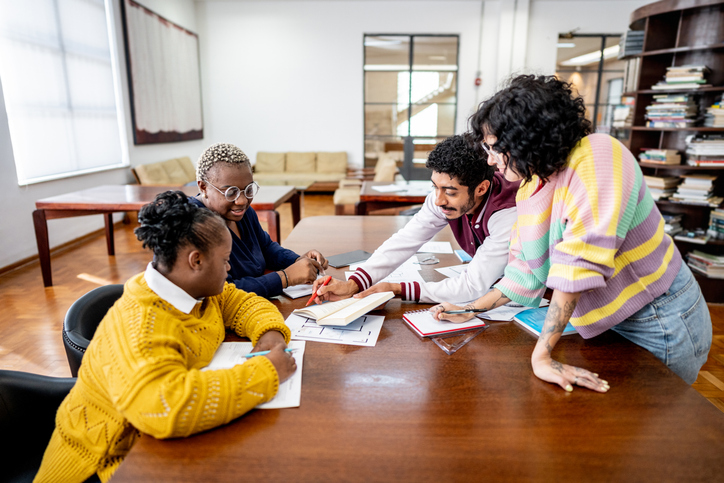Category: Education
How to Prepare for College Living: A Survival Guide for Incoming Students
February 15, 2025

Congratulations! You’ve been accepted into college, and soon, you’ll embark on one of the most exciting adventures of your life, along with 16 million others. But before you start dreaming about campus life, late-night study sessions, and newfound independence, there are some practical steps to ensure a smooth transition. From dorm essentials to financial planning, this guide will help you prepare for college living.
1. Master the Art of Budgeting
Living on your own means managing your finances wisely. Here’s how to stay on top of your budget:
- Create a Budget: Track your expenses, including tuition, rent, food, transportation, and entertainment.
- Use Budgeting Apps: Apps like Mint, YNAB, or PocketGuard can help you stay organized.
- Open a Student Bank Account: Many banks offer students accounts with low or no fees.
- Look for Discounts: Your student ID is your best friend—use it for travel, entertainment, and shopping discounts.
2. Pack Smart: The College Essentials Checklist
You don’t want to arrive at college and realize you forgot something crucial. Here’s what to bring:
- Dorm Room Must-Haves:
- Bedding (twin XL sheets, comforter, pillows)
- Storage bins and organizers
- Desk lamp and power strips
- Laundry hamper and detergent
- Shower caddy and flip-flops
- Tech Gear:
- Laptop and chargers
- Noise-canceling headphones
- Portable hard drive or cloud storage subscription
- Kitchen Supplies:
- Mini fridge (if allowed)
- Microwave or coffee maker
- Reusable water bottles and utensils
- Emergency Kit:
- First aid supplies
- Medications
- Flashlight and extra batteries
3. Set Up Your Health & Insurance Plan
Make sure you have a solid plan in place for medical needs:
- Health Insurance: Check if you’re covered under your parent’s plan or if your college offers coverage.
- Locate Healthcare Providers: Know where the nearest doctor, dentist, and urgent care clinic are.
- Stock Up on Essentials: Pack prescription medications, vitamins, and a basic first-aid kit.
4. Learn Basic Life Skills
College is a time to gain independence, so mastering basic skills will help you thrive:
- Cooking Basics: Learn how to make simple meals to save money and eat healthier.
- Laundry 101: Know how to separate colors, use detergent, and read washing machine settings.
- Time Management: College life is busy—use planners or apps to manage assignments and social activities.
5. Prepare for Roommate Life
Sharing a living space can be a challenge, but good communication helps:
- Set Boundaries Early: Discuss sleep schedules, cleaning duties, and guest policies.
- Be Respectful: Small gestures, like cleaning up after yourself, go a long way.
- Resolve Conflicts Maturely: Address issues directly and respectfully to maintain a positive environment.
6. Get to Know Campus Resources
Colleges offer plenty of support services—take advantage of them!
- Academic Support: Visit tutoring centers and writing labs.
- Mental Health Services: Many colleges offer free or low-cost counseling.
- Career Services: Start networking and building your resume early.
- Student Organizations: Join clubs to meet new friends and enhance your college experience.
College is a time of growth, challenges, and unforgettable experiences. By planning ahead, you can make the transition smoother and set yourself up for success. Embrace the adventure, stay organized, and don’t hesitate to ask for help when needed. You’ve got this!
InsureYouKnow.org
College graduation prompts transitioning from a school-based existence to one replete with adult responsibilities. By preparing for the unforeseen future, college grads who do their homework and keep their records at insureyouknow.org, can begin living their lives to the fullest.
Returning to College: A Simple Guide for Adults
December 1, 2024

Going back to college as an adult can be intimidating, but most people don’t realize that almost forty percent of all college students are adult learners over the age of 25. In addition to adult learners, more than 20% of undergraduate students are parents. Reasons for returning to school differ, such as wanting to enter a new field, ensure job security, or to set an example for their children and loved ones. Some may just want to finish what they started, as 36 million Americans have left college without completing their programs.
There are several perks to going back to school as an adult. The older you get, the more likely you are to know what degree to pursue, what workload you’ll be taking on, and what kind of pay to expect after graduation. These factors actually make it more likely that an adult learner will graduate with a degree that leads them to a better work situation, whether that’s a larger paycheck or a better work-life balance.
If you’ve been thinking about returning to school as an adult, here’s everything you should know before choosing the path that’s right for you.
Choosing the Right School for Your Needs
Different schools and degrees will come with different time and financial costs. It’s worth comparing your options, such as opting for a lower-cost school like a community college or looking into online schools if you’ll need to continue managing a busy schedule. Some schools are open admission, meaning all applicants are accepted, such as with community colleges, while others are more selective. If you want to apply to selective schools, then start the process several months to a year before you want to start classes.
Many schools offer flexible course schedules, including accelerated, self-paced, or part-time degree tracks. Online classes allow students to fit in their studies around their existing schedules. Remote and online learning options are no longer considered a lesser higher education experience and can often allow people juggling work and other adult responsibilities to achieve their school and career goals in a way that in-person classes would never allow them.
Be realistic about the time your classes and coursework will take you to complete. Many students underestimate the time it takes to complete a program. Reach out to the admissions office and ask how the school can help fit in classes around your busy schedule. “Many colleges will allow you to consider full- or part-time enrollment,” says Elaine Rubin, an Edvisors communications specialist. “If you aren’t attending school full-time, it will take you longer to complete your program or degree, but it may make it manageable. It’s best to talk about this with an admission counselor.
Noncredit education or certificate programs are becoming more popular, particularly in fields like project and program management and content development. While some of these programs require a degree to enroll, others are designed for people looking to switch fields or feel more qualified in a certain skill set, like fund-raising or human resources management. If this is a path you’re considering, take note of whether the institution is accredited, which means they would be taught by faculty and would be more useful if you do end up choosing to pursue a degree later on.
Paying for College Might be More Affordable Than You Thought
Paying for college as an adult isn’t much different than if you were going to college at 18. There are thousands of scholarships specifically meant for adult learners. In addition to scholarships, there are grants. Grants involve funds meant to pay for college that are usually given by the government and that you don’t need to pay back. Don’t make the mistake of assuming that you won’t qualify for college grants without applying first. Start by filling out the FAFSA online and contacting your potential school’s financial aid office.
Some of the most awarded grants include the Federal Pell Grant, which has a maximum payout of $7,395 for the 2024-2025 school year. The amount you’re awarded is determined by your financial need, the cost of your tuition, and whether you’ll be a part-time or full-time student. Other opportunities include a TEACH Grant, which is for students who want to become teachers but must agree to work in high-need areas for a certain amount of time after graduation, and state-based grants.
A 529 plan is a savings account specifically meant for college savings, and many adults don’t realize that they can open one for themselves. One of the biggest reasons to open a 529 is because your earnings won’t be subject to federal income taxes. In addition, 34 states offer additional tax breaks on these account earnings. If you have family members who want to help you go back to school, they can add up to $14,000 per year to your account as a gift to you without being taxed on their contribution.
Many colleges have started allowing adult learners to turn their work experience into college credits, saving them both money and time. Many employers also offer tuition reimbursement as part of their benefits packages now, so looking into your employee benefits may be the first step in determining ways to pay for college. Education-focused workplaces, especially those in tech and healthcare, will sometimes even allow you time off work to focus on your educational pursuits.
Last but not least is the option of taking out student loans. If you use debt in a smart way and only take out what you need to cover the cost of your schooling, a student loan is not a bad idea. Plus, adult learners with money management experience are less likely to abuse student loans. If you know you’ll be graduating and obtaining a career with a better paycheck, you can devise a timeline for paying off your debt as soon as possible after graduation.
Set Yourself Up for Success Before You Begin
Gathering your education records will be a good place to start when you’re narrowing down your different options. Not only will the schools you apply to require that you submit your transcripts, but you may also check to see if you have already met some of your degree requirements or prerequisites. If you have other technical schooling or certificates, then gather those as well.
“Most program policies on transfer credit typically have a maximum limit of 10 years,” says Dr. Bri Newland, assistant dean of the New York University School of Professional Studies Division of Applied Undergraduate Studies. “However, it is crucial to schedule a meeting with an experienced academic advisor who will thoroughly assess your transcripts alongside you, regardless of whether you acquired these credits beyond the specified timeframe.”
When going back to college as an adult with other responsibilities like an existing career or family, staying organized will be essential to your survival. Once you get started with classes, keep track of deadlines and due dates, giving yourself plenty of time to study and complete coursework. Determine where and when you’ll get your work completed, such as a designated space at home or a campus library, and which days and times you’ll use to get your classwork completed. Developing a routine that you can stick to will ensure your success, even when unexpected obstacles arise.
Once you do some research, you’ll likely discover that going back to school and attaining the degree you desire is more feasible than you may have thought. With Insureyouknow.org, you may keep track of your transcripts and certificates, college applications, financial costs and payment methods, and eventually, your new degree.
College Pathway for Students with Intellectual Disabilities
August 30, 2024

When raising a child with special needs, there’s no one-size-fits-all approach to preparing for college. Everyone’s situation varies significantly depending on the intellectual or developmental disability. Many parents utilize high school-to-college transition programs, while others choose vocational or life-skills training routes.
Students with IDD (intellectual or developmental disabilities) such as autism, visual impairment, and deaf or hard of hearing, can complete a traditional college degree with accommodations provided through a college’s Disabled Students’ Programs and Services (DSPS) department. Students with intellectual disabilities that wouldn’t be able to participate in a regular college program still have options. There’s an increasing number of non-degree programs designed specifically for students with intellectual disabilities on college campuses. These programs allow students to take college courses part of the time while also learning how to live independently and gain work experience in businesses that fit their career goals.
No matter what goals you have for your child, it’s important to research the options available to you early on.
Make Post-Graduate Plans Well in Advance
Ninth grade is the perfect time to begin planning for after high school graduation. Parents and students should work closely with their school’s guidance counselors, transition specialists and any other outside resources, such as your state’s rehabilitation services department, to put a plan in place.
Chances are if you have a teen with special needs, then you have experience working closely with school personnel each year to coordinate all the necessary accommodations with their Individualized Education Plan (IEP). If you’re unclear about the transitional process or post-secondary options, don’t be afraid to ask questions. Many parents can find the planning process overwhelming, so working with the resources you already have is a great place to begin.
Work With the College You Choose for Support
When you begin to narrow down possible programs and colleges that might fit the needs of your child, get in touch with those potential schools and talk to them about what they offer. “For students choosing to attend college after graduation, contact the Special Services Office at the campus as you plan your college visits,” says Sandye Cox, a transition consultant at Region 10 Education Service Center in Richardson. “Students who have received special education accommodations at the high-school level may be eligible for services at the college level,” she says.
Project CASE (Connections for Academic Success and Employment) is a high school-to-college transition program, for example, that helps students ages 18 to 25 with developmental disabilities to earn an academic degree or technical certification, as well as seek employment. They help students keep a log of academic and social progress and work with them to set up expectations and back-up plans. Services such as these provide encouragement and help students remain motivated. Other centers like The Burkhart Center for Autism Education and Research at Texas Tech University assign a learning specialist to students accepted into the program to help them navigate college life.
If you’re unsure about what a college has to offer your child, give them a call. You’ll likely discover there are many opportunities as campuses are striving to be accessible and suit every student’s unique needs.
Highly-Rated Colleges for Students With IDD
There are programs at colleges across the country designed to help neurodiverse students succeed, whether they have a physical disability, a developmental one, or one related to learning. When researching schools, get familiar with what accommodations and support services they offer students with disabilities. Other factors to check for are campus accessibility, a culture of diversity and inclusiveness among students, and whether or not the programs offered fit the career goals and interests of your child. Once you have a list of potential schools, contact the college’s office for disability services for more information and try visiting the campus in person before applying for admission.
Here are six of the best colleges for students with disabilities.
1. InclusiveU at Syracuse University. Developed out of the Taishoff Center for Inclusive Higher Education, this program offers students with intellectual and developmental disabilities the opportunity to experience fully inclusive college life at Syracuse University. They offer individualized coursework, mentors and Peer2Peer support, and weekly seminars on topics like health and wellbeing, budgeting, dating and relationships, and conflict resolution. They also help with pursuing semester-long internships and on-campus jobs, in addition to a variety of social and extracurricular activities.
2. Next Steps at Vanderbilt University. Next Steps is a four-year program that helps students with intellectual disabilities to develop academically, socially, and professionally. Next Steps students are part of the Best Buddies program that fosters friendships with general education students. Peer mentors serve as lunch or workout partners, academic tutors, and daily planners to help students dive deeper into the typical college experience.
3. Destination Dawgs at the University of Georgia. Destination Dawgs is a five-semester certificate program for students with intellectual disabilities. The program allows students to prepare for their transition into adulthood with on-campus housing, peer support, and career training. They offer courses alongside directed studies tailored to each students’ interests and career goals.
4. IDEAL at Georgia State University. The IDEAL (Inclusive Digital Expression and Literacy) program is for students with mild intellectual disabilities between the ages of 18 and 25. They focus on the development of media literacy, storytelling, and media production skills so that each student can find their “voice.” Support is received through peer-mentors, and students can participate in internships with local businesses and arts organizations.
5. The Mason LIFE Program at George Mason University. The Mason LIFE Program is a four-year program for young adults with IDDbb who seek the benefits of a supportive academic environment within a university setting. Students attend classes 20 hours a week in traditional courses alongside program courses like banking, mindfulness, and human sexuality and relationships.
6. Aggie ACHIEVE at Texas A&M University. Aggie ACHIEVE (Academic Courses in Higher Inclusive Education and Vocational Experiences) is a four-year inclusive program designed to equip students with IDD for future employment. ACHIEVE students live on-campus and have access to all campus-related activities and events. Each student’s program is tailored to their unique goals, and they have internship opportunities within their field of interest.
Many parents want their children to remain close by and in-state. ThinkCollege.net is a user-friendly directory of college programs for every state. Insureyouknow.org can provide one easy-to-access place where you can compile your research, store educational records, and track your child’s achievements. “Do not assume that they won’t be able to achieve. Every student — disabled or not — needs a good education,” says Martha Siegel, a mother of a son who has Asperger’s. “Love your children and guide them, but give them independence,” she says.
